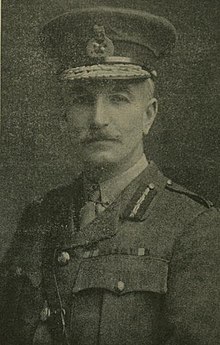William Marshall (British Army officer)
| Sir William Marshall | |
|---|---|

Lieutenant General Sir William Marshall
|
|
| Born | 29 October 1865 Stranton, near Hartlepool, County Durham, England |
| Died | 29 May 1939 (aged 73) Bagnoles-de-l'Orne, France |
| Allegiance |
|
| Service/branch |
|
| Rank | Lieutenant General |
| Commands held | Southern Army, India |
| Battles/wars |
Second Boer War First World War |
| Awards |
Knight Grand Cross of the Order of St Michael and St George Knight Commander of the Order of the Bath Knight Commander of the Order of the Star of India |
Lieutenant General Sir William Raine Marshall GCMG KCB KCSI (29 October 1865 – 29 May 1939) was a British Army officer who in November 1917 succeeded Sir Frederick Stanley Maude (upon the latter's death from cholera) as Commander-in-Chief of the British forces in Mesopotamia. He kept that position until the end of the First World War.
Marshall was born the village of Stranton, near Hartlepool, County Durham. He was the younger son of solicitor William Marshall and his wife, Elizabeth (née Raine).
He first went to Repton School and then Royal Military College, Sandhurst. He received a commission into the Sherwood Foresters in 1886, after which he served on the Malakand expedition, on the North West Frontier and on the Tirah expedition before fighting in the Second Boer War. Following the end of the war, in late May 1902, Marshall received a brevet promotion to lieutenant-colonel in the South African Honours list published on 26 June 1902.
...
Wikipedia
